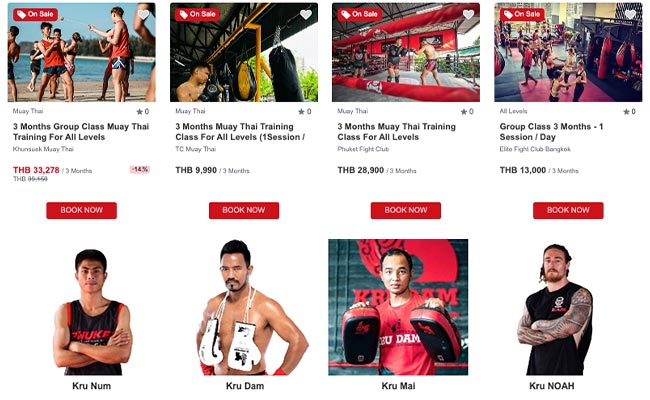Thailand has announced a unique visa scheme catering specifically to foreigners seeking Muay Thai training within the country.
This initiative allows martial arts enthusiasts to extend their stay from the standard 60 days to an extended period of 90 days.
The announcement follows the establishment of the National Soft Power Strategy Committee, focusing on elevating Thailand's influence in various sectors.
The committee's overarching goal is to enhance Thailand's soft power across multiple domains, encompassing festivals, tourism, food, art, design, sports, music, books, films and fashion. Notably, traditional Thai boxing, Muay Thai, has emerged as a key focal point within this strategy.

Why a Dedicated Muay Thai Visa?
Beyond extending the duration of stay for tourists, the government wants to enhance the quality of Muay Thai training and the proficiency of trainers. To achieve this, The Department of Skill Development has been asked to conduct specialized training sessions for Muay Thai trainers, and issue certificates for those who complete the training.
Thai trainers with these credentials will be considered to have the necessary expertise to train tourists in the sport, thereby elevating Muay Thai on the global stage and providing economic opportunities for Thai trainers.
An estimated 60,000 to 70,000 foreigners annually visit Thailand specifically for Muay Thai training, with many international participants engaging in Muay Thai competitions held in the country. The visa will make it easier for trainees to stay longer and access reputable trainers and facilities.
The Official Website
The Now Muay Thai website platform aims to streamline the process of finding affordable classes and credible trainers. You can filter your search for a class by area, level, duration and rating score.
You can book and make payment via the website, though refunds are applied for via the Facebook page.
Whether applicants will have to apply for the actual visa through their local Thai embassy, or through the existing online visa portal, is yet to be announced.
It's quite interesting that the government will be running this centrally, I assume through the Tourism Authority of Thailand (TAT). I'm surprised a startup business hasn't emerged in recent years to bring all the gyms and trainers and bookings under one roof, and charged a listing fee and commission on each booking. It does appear to be a lucrative opportunity given the increasing popularity of fight sports.
The Now website, which is comparably modern to Thai embassy websites around the globe, is accompanied by already popular Facebook and Instagram pages – each laden with exciting Muay Thai clips.
I have to say, so far it all looks quite professionally done.
Muay Thai Visa Requirements
The exact launch date remains undisclosed, and the requirements currently announced. I will update this section as soon as further details are available. However, at a guess, I'd say the requirements will be similar to a single-entry tourist visa.
See tourist visa details here.

Why Not Just Extend a Tourist Visa?
I knew you'd ask that. And you'd be correct.
Currently, one can obtain a Single-Entry Tourist Visa to learn Muay Thai for a period of 90 days. This visa can be extended for a further 30 days at a local Thai immigration office for a price of 1,900 Baht. This gives you a 90-day stay (if you extend on the final day of your initial 60 days).
This new Muay Thai Visa is a way of avoiding having to do that extension, which is a bit of a hassle when you are in full Thailand holiday and Muay Thai training mode.
Also bear in mind that immigration can refuse an extension. They have the discretion to do that. It doesn't happen often, but it does happen.
Wait! Isn't There Already a Muay Thai Study Visa?
Correct again. Muay Thai is one of the categories available under the Education Visa, which enables an initial 90-day entry, and then an extension depending on the duration of your course.
The ED Visa, as it is known, is applied for at a local Thai embassy in your home country. To apply, you must have a letter of acceptance from the educational company you wish to study with.
While this visa is generally a pathway for those wanting to study the Thai language, it also covers cooking , Thai massage, scuba diving, yoga, and Muay Thai courses.
The initial 90-day visa can be extended to a maximum of 8 months, depending on your course duration. I have extensive details on the Education Visa here.
So why bother with a separate Muay Thai visa?
Well, given the planned heavy promotion of the sport this year, the fancy new website and third party relationships with trainers and gyms; from a marketing prospective, it makes sense.
Separating Muay Thai out from the ED visa brings it into the spotlight and therefore easier to promote.
In addition, many of the Thai visa categories are convoluted and often difficult for new applicants to understand, which is why the likes of me have these extensive posts – to help navigate the red tape. Putting the whole scheme under the streamlined umbrella of Muay Thai will work better than having a promotion that directs applicants to an Education Visa.
Lastly, the National Soft Power Strategy Committee has said that a similar visa will be offered to tourists who wish to learn Thai classical dance and music, or cook Thai food, so perhaps the bigger plan is to break up the Education Visa into individual categories.
——
Got a comment or question? Leave it below.
Last Updated on



Eva says
Mar 28, 2024 at 8:14 am
TheThailandLife says
Mar 28, 2024 at 6:56 pm
Mike Baker says
At my age and fitness, that is very important......
Feb 02, 2024 at 6:53 pm
TheThailandLife says
Feb 02, 2024 at 6:57 pm
Mike Baker says
Feb 02, 2024 at 6:43 pm
TheThailandLife says
Feb 02, 2024 at 6:46 pm